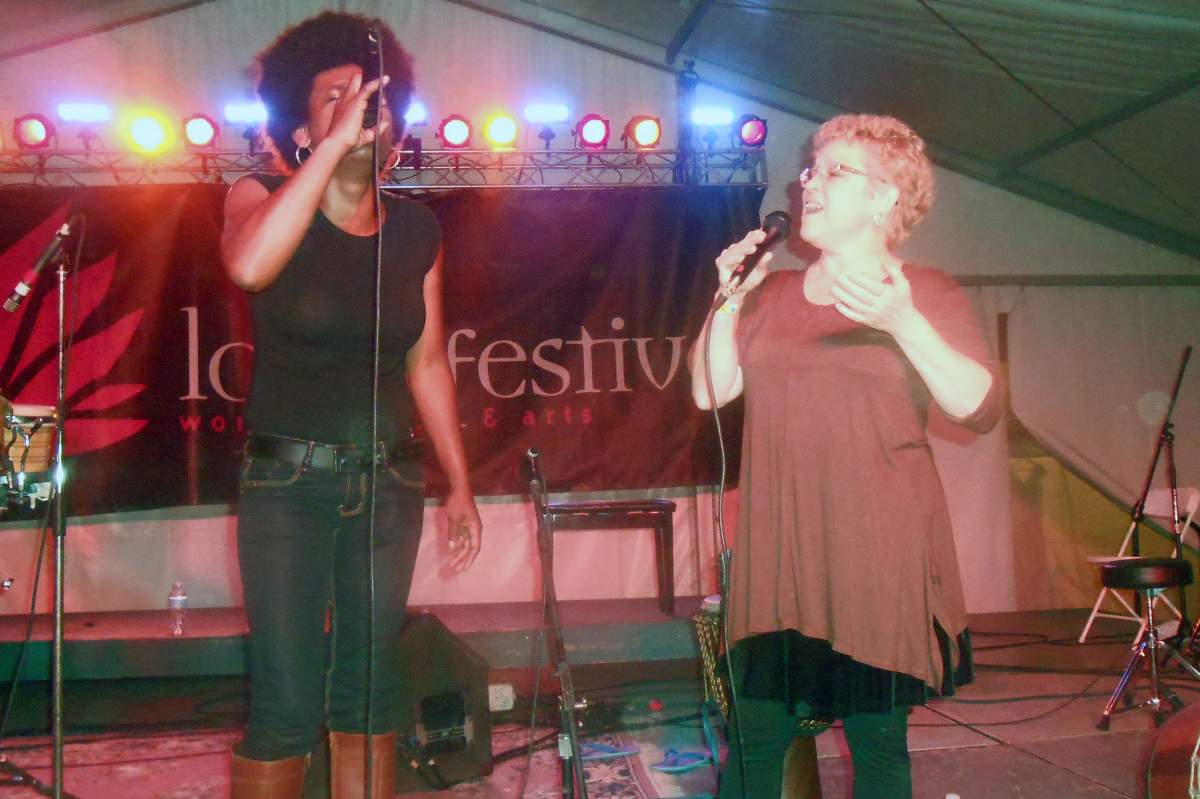
The Lotus World Music and Arts Festival brings acts from around the world to Bloomington, Indiana for a multi-night extravaganza each year, and the festival's 20th anniversaryheld September 25-29th, 2013was no exception. Bloomington crowds were regaled with music from Ghana, Ukraine, Newfoundland, India, and Finland-just for starters. But it's the connections festival-goers forge within this exotic pageant that seem to hold the key to Lotus' enduring draw.
There was so much give and take between the crowd and the performers. But you see that here all the time. I mean, that crosses all genres.
"It's that energy transfer between the audience and the performers," explains Steve Llewellyn, a Bloomington filmmaker who's been to at least 19 Lotus fests. He claims he can't remember whether he made the inaugural event, back in 1994, "It was so long ago!"
Sheer Energy
The veteran festival goer concedes that he is by no means a world music expert, and he doesn't do a lot of research in advance. He might briefly look at a few of the acts online before attending. Llewellyn is interested in the instruments the musicians are playing, and the influences and traditions that can be traced in the music. But usually, for him, it comes down to energy.
In past years, Llewellyn was struck by the way the gypsy jazz trio Semarabalouf and the percussion ensemble Nass Marrakech seem to have created that energetic connection with the Lotus crowd. "They were phenomenal," Llewellyn recalls. "Both acts had the audience in a dancing frenzy like I've never seen before or since."
This year, Llewellyn recognized that intangible feeling in two performances Wednesday and Friday nights by Malian musician Bassekou Kouyate and his Ngoni Ba family band. Playing gourd percussion and homemade instruments, including the ngoni-"the grandfather of the guitar and banjo"Kouyate and his wife, two sons, two brothers and a nephew "were so happy…they had soul," Llewellyn asserts. "There was so much give and take between the crowd and the performers. But you see that here all the time. I mean, that crosses all genres."
A Spiritual Réunion
Crossing genres, and a continent, Lotus attendees present in the Ivy Tech/Old National tent on 4th Street Saturday night around 10 pm were witness to another connection being made, when singer Christine Salem, from the French overseas department of La Réunion, an island near Madagascar in the Indian Ocean, invited local jazz singer Janiece Jaffe to the stage.
Several delighted fans hoisted the petite blonde chanteuse to the platform to take her place alongside the controversial Salem, who sings maloya, songs that originated with the slaves who worked La Réunion's sugar plantations. Maloya, traditionally used in drumming and chanting ceremonies in which participants enter a trance-like state that allows them to see their ancestors, were banned until 1981.
Before an ecstatic crowd, Jaffe joined Salem in an a cappella song about Nelson Mandela, and freedom. You may hear their performance using the player above.
The singers had met on the street the evening before, when Jaffe's daughter Selena, a French speaker who has lived in Corsica, was serving as Salem's interpreter.
Vibrating At The Same Frequency
"And then we were talking about singing," Jaffe recounts," and trance singing, and I said, ‘Yeah, I do that too.'" Jaffe told Salem and the band about the healing work she does, using sound to balance the energies of the body. Jaffe is a practitioner of reiki, who also uses crystal singing bowls in her sound healing therapy.
Out on the sidewalk Friday night, Jaffe traded one of her signature bebop tunes for one of Salem's maloya-infused numbers. By the end of the impromptu jam session, Jaffe had been invited to sit in for a song at the end of Saturday night's set. The song they proposed was "a song of freedom that the people sing," Jaffe explains. "And when I found that out, I said, ‘YES, yes. Are you kidding me?'"
Singing with Salem "was like a dream," Jaffe claims. "I just remember her energy, in her face, and getting right close to her so that I feel what she was feeling, so that I could do something around that."
"Christine was talking about how, when she's performing these songs, she feels the spirit in the audience," Selena Jaffe adds, "how there's that connection and they do go into a trance with her."
That spiritual component of the music is everything for Jaffe.
"It's why we sing, it's why we play," Jaffe agrees: "to access the spirit. At least that's how I feel. I don't remember a lot, when I'm singing. I've done a lot of preparation. And then I can be present for the moment for the music that wants to come through. And I think she's that way too. So it was so wonderful to meet her, and to be able to do that."






